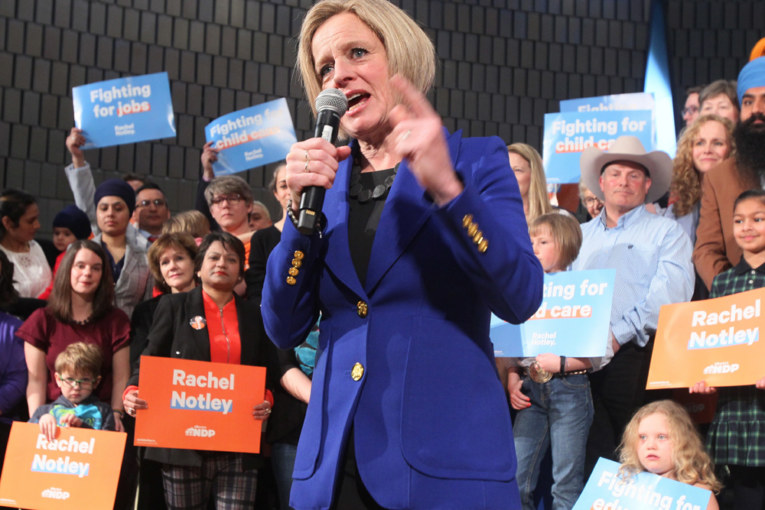
CALGARY — Alberta Premier Rachel Notley called an election Tuesday, kicking off a campaign at a time when some of the province’s labour market indicators are showing their worst signs during a election cycle in more than 30 years.
Notley’s campaign begins at a time when all active pipeline proposals out of the province have been delayed, unemployment has remained persistently high as a result of low and volatile oil and gas prices, and the pace of economic growth is slowing.
“I know these past few years have been very tough. They’ve been scary for a lot of families,” Notley said in Calgary, a key re-election battleground for the NDP government as it fights a challenge from the United Conservative Party.
Jason Kenney, the leader of the UCP, kicked off his campaign Tuesday at an event in an industrial yard south of Edmonton with a sign that had three words stacked on top of each other: “jobs,” “economy” and “pipelines.”
“One thing Albertans hate is unemployment and the corrosive effect it has on people’s lives,” Kenney said, adding that his party would be “obsessed” with creating jobs.
The most recent poll, by Ipsos and conducted for Global News, shows the UCP leading the NDP by 18 percentage points.
The province’s struggling economy is widely expected to be a main point of debate throughout the campaign as Albertans prepare to vote on April 16 and jobs are expected to be a key issue.
“Since the depths of the recession our economy has created over 80,000 jobs,” Notley said, though she noted the province’s economy continues to face challenges including a lack of new pipelines.
The province’s unemployment rate has been rising again, inching steadily up from a two-year-low of 6.2 per cent in Nov. 2018 to 7.3 per cent in Feb. 2019.
More troubling, however, the rate of participation in the province’s labour force is among the worst during an election cycle since data was first recorded in 1976, University of Alberta associate economist professor Joseph Marchand said.
The province’s labour force participation rate, which measures what proportion of able workers are employed or job hunting, is 71.8 per cent, compared with 73.7 per cent during the last election cycle in May 2015.
And the province’s employment rate is 66.5 per cent, compared with 68.9 per cent during the last election cycle.
“This is historically the worst or tied for the worst,” Marchand said of how the two measurements compare with data from previous election cycles. “I think this should be the central focus of this election cycle.”
A large reason for the declines in employment and labour force participation is there are fewer young people, aged 15 to 24, employed in the province and significantly fewer employed in the energy sector.
For 15- to 24-year-olds, Marchand said there are 10 per cent fewer of those workers in the labour force and 11 per cent fewer employed.
Notley led the NDP to power at a time when large Calgary-based companies were laying off staff to cut costs amid low oil prices, but those jobs did not return as lack of export pipelines negated any gains from rebounding commodity prices.
Of the 45,200 direct jobs lost in the province’s oil and gas sector between 2014 and 2015, roughly 27,500 jobs have been regained, according to Carol Howes, vice-president of communications and the petroleum labour market division of Energy Safety Canada.
“So we’ve seen some (jobs) come back since the end of 2014, we’ve seen some increase, but then we’re still at least 18,000 jobs away from where we were in 2014,” she said, adding that she’s expecting a further decline in oil and gas employment this year as capital investment falls.
Investment in the energy sector in Canada has fallen a dramatic 58 per cent to an expected $23.8 billion this year, compared to $57.2 billion in 2014, according to Conference Board of Canada director, provincial forecasts Marie-Christine Bernard.
Bernard said her last real GDP growth forecast for Alberta show the economy slowing to 1.3 per cent this year, from 2.5 per cent in 2018. But now she expects to revise that forecast down due to lower drilling activity, delays to Enbridge Inc.’s Line 3 pipeline and slowdown of Imperial Oil Ltd.’s Aspen oilsands project.
“Investment is not going to be great in the energy sector,” she said.
• Email:
You can read more of the news on source
